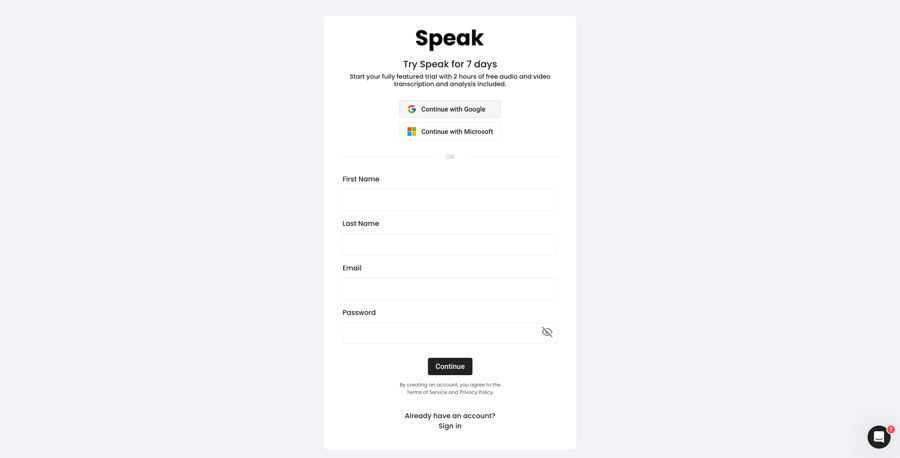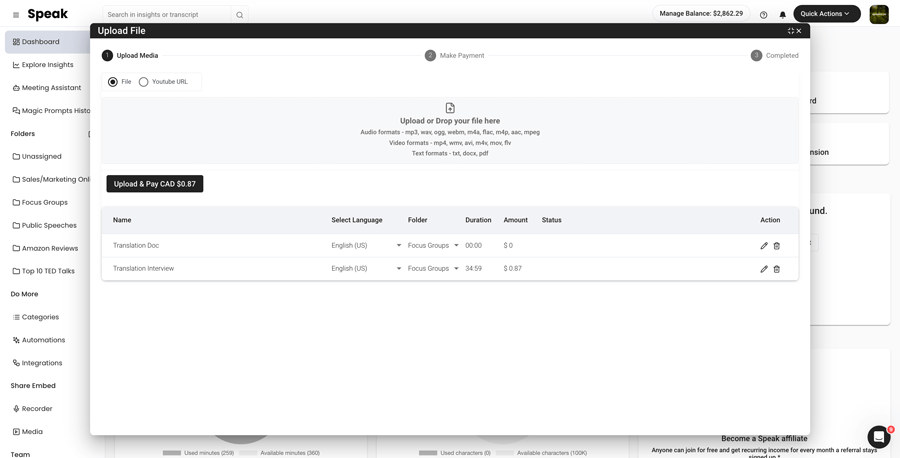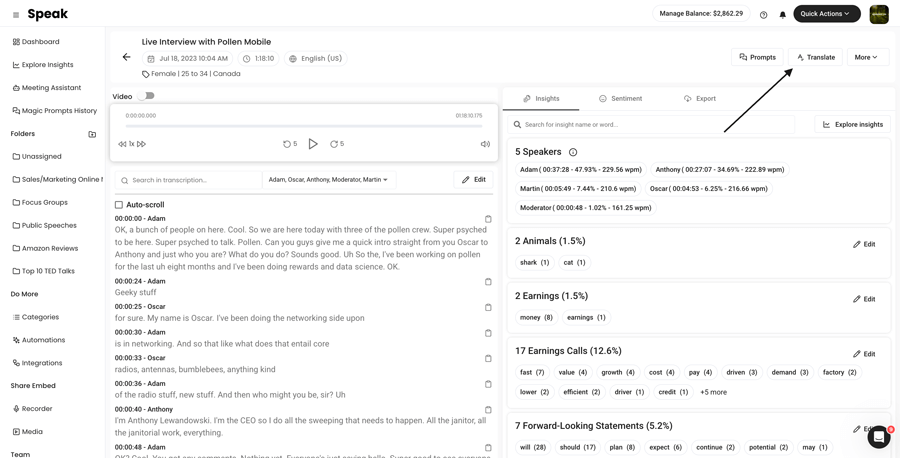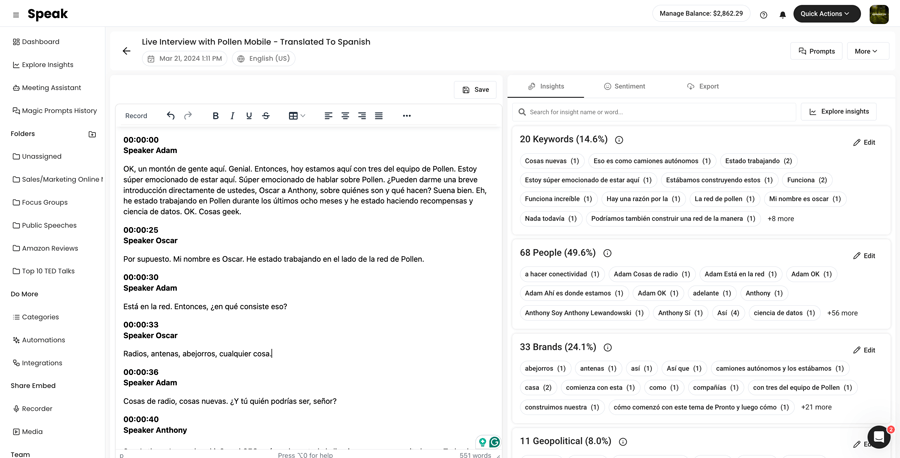How To Translate English to Scots Gaelic
Translating English to Scots Gaelic is super simple!

Step 1: Register for Speak
Register for Speak using this link.
Once you register, you can instantly begin translating your English to Scots Gaelic file(s).

Step 2: Upload Your English file(s)
As soon as you log in, you will be redirected to the dashboard.
Once there, you can select the Quick Action "New Upload".
In Speak, you can seamlessly upload, transcribe and translate audio, video and text files all at once!

Step 3: Translate Your English file(s) to Scots Gaelic
Once the file is uploaded, simply visit your file and select "Translate".
If it is an audio and video file, Speak will ask you if you want to keep the speaker names and timestamps in the translation.
Want to translate many files at once? No problem!
You can view the files you want to automatically translate from English to Scots Gaelic from the folder level and instantly translate as many files as you need with our artificial intelligence translation in just a few clicks.

Step 4: That's It! View, Analyze, Modify & Export Your New Scots Gaelic file(s)
Once the translation is done, you will be alerted and you will see a new document in the same folder your original file is in.
The file will be named the same but with a dash indicating that it is the translated version.
Need support with your English translation?
We are always here and happy to help at Speak!
Just send us a message on live chat on the bottom right corner and we will ensure you are set up for success.
Interested in translating English or other languages to different languages? View our entire list of supported translation languages here.
Automatic, accurate, instant AI translation from English to Scots Gaelic is here for you.
Register for Speak using this link and begin translating English to Scots Gaelic today.
Unlocking the Rich Heritage: Translate English to Scots Gaelic
Welcome to a journey that bridges centuries and cultures — translating English to Scots Gaelic. In an era where the pace of globalization threatens to erase the unique tapestries of language, preserving and understanding linguistic heritage has never been more critical. Speak AI, a leading voice in integrating advanced NLP and transcription software, is at the forefront of this linguistic renaissance. With our cutting-edge technology, translating from English to Scots Gaelic has been transformed from a painstaking task to a seamless, enriching experience.
The Value of English to Scots Gaelic Translation
In the realm of translation, every language pair presents its own set of challenges and opportunities. When it comes to English to Scots Gaelic translation, the benefits are profound, ranging from cultural preservation to opening doors for business and research in Gaelic-speaking regions.
For Businesses and Marketers
Imagine reaching out to the heart of the Scottish Highlands with your products or services, communicated in the deeply resonant and historic Scots Gaelic language. Speak AI's translation tools empower businesses to foster deeper connections with this niche but valuable market segment, enhancing brand loyalty and engagement.
For Researchers and Academics
The translation of historical documents, literature, and contemporary works from English to Scots Gaelic (and vice versa) is invaluable. It not only preserves the linguistic heritage but also offers academics and researchers unique insights into the Gaelic culture, expanding the horizons of Celtic studies.
Time and Cost Efficiency
With Speak AI, the daunting task of translation becomes a matter of seconds. Automatic translation powered by AI saves countless hours of manual work, reducing costs and streamlining processes whether you're transcribing historic texts or localizing your latest marketing campaign.
How Speak AI Is Revolutionizing Translation
Our platform integrates NLP, large language models, data visualization, and generative AI, ensuring your English to Scots Gaelic translations are not just accurate, but also contextually and culturally relevant. Plus, our AI Meeting Assistant feature brings unparalleled efficiency to transcribing and translating meetings held in either language, automatically in real-time.
AI-Powered Accuracy and Speed
Speak AI's software leverages advanced algorithms to understand the nuances of both English and Scots Gaelic, ensuring high accuracy and natural translation outcomes that respect linguistic intricacies.
Enhanced Accessibility and Engagement
By breaking down language barriers, our technology enhances accessibility for Scots Gaelic speakers, promoting inclusivity and engagement across various media, from academic papers to digital content.
Seamless Integration
Our software seamlessly integrates with popular platforms like Microsoft Teams, Zoom, Google Meet, and Webex, making it easier than ever to connect, communicate, and conduct business or research across language divides.
Embracing Scots Gaelic: A World of Opportunity
Beyond the utility of translation, embracing Scots Gaelic through technology like Speak AI opens a window to a culture steeped in history, folklore, and the unyielding spirit of Scotland. It's an invitation to explore, understand, and cherish a linguistic heritage that has shaped generations.
FAQs: English and Scots Gaelic
Where are English and Scots Gaelic Popular?
While English is a global lingua franca, Scots Gaelic boasts its stronghold in Scotland, especially in the Highlands and the Western Isles. Intriguingly, there are also Gaelic-speaking communities in Canada, particularly in Nova Scotia, where Scottish emigrants settled in the 18th and 19th centuries.
Fun Facts About Scots Gaelic
- Scots Gaelic was once the dominant language of the whole of Scotland but now is primarily spoken in the Highlands and Islands.
- The Scottish Parliament has made efforts to revive the language, recognizing its cultural significance.
- Scots Gaelic has its own unique alphabet with 18 letters.
Differences and Similarities Between English and Scots Gaelic
The two languages share a geographical history but diverge significantly in grammar, syntax, and phonology. English is a Germanic language, while Scots Gaelic is Celtic. They do, however, share some loanwords and have influenced each other culturally and linguistically over centuries of close proximity.
In conclusion, translating English to Scots Gaelic is more than a linguistic exercise—it's an act of cultural preservation, a bridge to understanding, and a gateway to untapped opportunities. With Speak AI's advanced translation technology, you're not just translating words; you're embracing a piece of Scotland's soul.
Embrace the power of AI to explore the linguistic legacy of Scots Gaelic, forge deeper connections, and unlock new possibilities. Discover Speak AI today, and let's bring the beauty of Scots Gaelic to the world together.
Translate English To These Other Supported Languages:
- Translate English-to-Afrikaans
- Translate English-to-Albanian
- Translate English-to-Amharic
- Translate English-to-Arabic (Egypt)
- Translate English-to-Arabic (Iraq)
- Translate English-to-Arabic (Israel)
- Translate English-to-Arabic (Jordan)
- Translate English-to-Arabic (Kuwait)
- Translate English-to-Arabic (Lebanon)
- Translate English-to-Arabic (Oman)
- Translate English-to-Arabic (Palestinian Authority)
- Translate English-to-Arabic (Qatar)
- Translate English-to-Arabic (Saudi Arabia)
- Translate English-to-Arabic (Syrian Arab Republic)
- Translate English-to-Arabic (United Arab Emirates)
- Translate English-to-Arabic Modern Standard (Bahrain)
- Translate English-to-Armenian
- Translate English-to-Assamese
- Translate English-to-Aymara
- Translate English-to-Azerbaijani
- Translate English-to-Bambara
- Translate English-to-Basque
- Translate English-to-Belarusian
- Translate English-to-Bengali
- Translate English-to-Bhojpuri
- Translate English-to-Bosnian
- Translate English-to-Bulgarian
- Translate English-to-Catalan
- Translate English-to-Cebuano
- Translate English-to-Chinese (Simplified)
- Translate English-to-Chinese (Traditional)
- Translate English-to-Corsican
- Translate English-to-Croatian
- Translate English-to-Czech
- Translate English-to-Danish
- Translate English-to-Dari
- Translate English-to-Dhivehi
- Translate English-to-Dogri
- Translate English-to-Dutch
- Translate English-to-English
- Translate English-to-English (Australia)
- Translate English-to-English (Indian)
- Translate English-to-English (Irish)
- Translate English-to-English (New Zealand)
- Translate English-to-English (Scottish)
- Translate English-to-English (South African)
- Translate English-to-English (United Kingdom)
- Translate English-to-English (United States)
- Translate English-to-Esperanto
- Translate English-to-Estonian
- Translate English-to-Ewe
- Translate English-to-Farsi (Persian)
- Translate English-to-Filipino Tagalog
- Translate English-to-Finnish
- Translate English-to-French
- Translate English-to-French (Canada)
- Translate English-to-Frisian
- Translate English-to-Galician
- Translate English-to-Georgian
- Translate English-to-German
- Translate English-to-German (Swiss)
- Translate English-to-Greek
- Translate English-to-Guarani
- Translate English-to-Gujarati
- Translate English-to-Haitian Creole
- Translate English-to-Hausa
- Translate English-to-Hawaiian
- Translate English-to-Hebrew
- Translate English-to-Hindi
- Translate English-to-Hmong
- Translate English-to-Hungarian
- Translate English-to-Icelandic
- Translate English-to-Igbo
- Translate English-to-Ilocano
- Translate English-to-Indonesian
- Translate English-to-Irish
- Translate English-to-Italian
- Translate English-to-Japanese
- Translate English-to-Javanese
- Translate English-to-Kannada
- Translate English-to-Kazakh
- Translate English-to-Khmer
- Translate English-to-Kinyarwanda
- Translate English-to-Konkani
- Translate English-to-Korean
- Translate English-to-Krio
- Translate English-to-Kurdish
- Translate English-to-Kurdish (Sorani)
- Translate English-to-Kyrgyz
- Translate English-to-Lao
- Translate English-to-Latin
- Translate English-to-Latvian
- Translate English-to-Lingala
- Translate English-to-Lithuanian
- Translate English-to-Luganda
- Translate English-to-Luxembourgish
- Translate English-to-Macedonian
- Translate English-to-Maithili
- Translate English-to-Malagasy
- Translate English-to-Malay
- Translate English-to-Malayalam
- Translate English-to-Maltese
- Translate English-to-Maori
- Translate English-to-Marathi
- Translate English-to-Meiteilon (Manipuri)
- Translate English-to-Mizo
- Translate English-to-Mongolian
- Translate English-to-Myanmar (Burmese)
- Translate English-to-Nepali
- Translate English-to-Norwegian
- Translate English-to-Nyanja (Chichewa)
- Translate English-to-Odia (Oriya)
- Translate English-to-Oromo
- Translate English-to-Pashto
- Translate English-to-Persian
- Translate English-to-Polish
- Translate English-to-Portuguese
- Translate English-to-Portuguese (Brazilian)
- Translate English-to-Portuguese (Portugal)
- Translate English-to-Punjabi
- Translate English-to-Quechua
- Translate English-to-Romanian
- Translate English-to-Russian
- Translate English-to-Samoan
- Translate English-to-Sanskrit
- Translate English-to-Scots Gaelic
- Translate English-to-Sepedi
- Translate English-to-Serbian
- Translate English-to-Sesotho
- Translate English-to-Shona
- Translate English-to-Sindhi
- Translate English-to-Sinhala
- Translate English-to-Sinhala (Sinhalese)
- Translate English-to-Slovak
- Translate English-to-Slovenian
- Translate English-to-Somali
- Translate English-to-Spanish
- Translate English-to-Spanish (Mexico)
- Translate English-to-Sundanese
- Translate English-to-Swahili
- Translate English-to-Swedish
- Translate English-to-Tajik
- Translate English-to-Tamil
- Translate English-to-Tatar
- Translate English-to-Telugu
- Translate English-to-Thai
- Translate English-to-Tigrinya
- Translate English-to-Tsonga
- Translate English-to-Turkish
- Translate English-to-Turkmen
- Translate English-to-Twi (Akan)
- Translate English-to-Ukrainian
- Translate English-to-Urdu
- Translate English-to-Uyghur
- Translate English-to-Uzbek
- Translate English-to-Vietnamese
- Translate English-to-Welsh
- Translate English-to-Xhosa
- Translate English-to-Yiddish
- Translate English-to-Yoruba
- Translate English-to-Zulu



